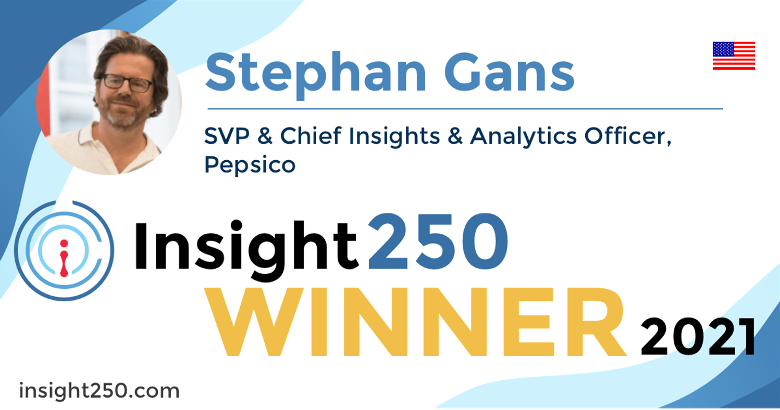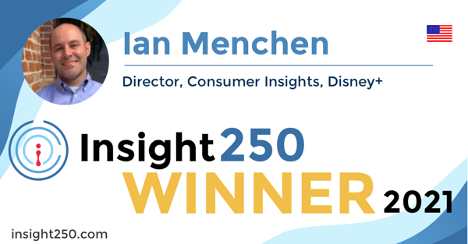


The Insight250 spotlights and celebrates 250 of the world’s premier leaders and innovators in market research, consumer insights and data-driven marketing. The inaugural list was revealed this April and created renewed excitement across the industry whilst strengthening the connectivity of the market research community.
With so many exceptional professionals named to the Insight250 it seems fitting to tap into their expertise and unique perspectives across an array of topics. This weekly series focuses on doing just that; inquiring about the expert perspectives of many of these individuals in a series of short topical features.
This edition features two exceptional experts who deliver insights and analysis to drive the strategy of leading products for Disney and PepsiCo. Stephan Gans is the Senior Vice President and Chief Insights and Analytics Officer for PepsiCo and Ian Menchen is Director of Consumer Insights for Disney+, Walt Disney Company’s streaming service.
As markets have shifted and engagements have evolved in today’s ‘Age of COVID,’ consumer consumption has changed as well. Limitations and isolation have provided both challenges and opportunities for brands with few more than those at PepsiCo and Disney have had to face. Disney+ has made a massive impact on the Walt Disney Company, with CEO, Bob Chapeck saying in October 2020, “We are tilting the scale pretty dramatically [toward] streaming.” Disney is now regularly releasing feature films, including Soul, Mulan, Black Widow and Jungle Cruise whilst making major investments in the Disney+ platform. PepsiCo also undertook adjustments in the pandemic that have benefited its portfolio of brands as consumers stocked up on snack foods. “We have figured out how to do well in this environment,” said PepsiCo Chief Financial Officer, Hugh Johnston.
Crispin: Obviously, the past year has seen dramatic shifts in the ways consumers consume products. How have these trends impacted your business on both a positive and negative basis?

Stephan: “PepsiCo’s Insights team is consistently monitoring and predicting how consumers’ snacking and drinking habits are shifting and evolving. Clearly, the pandemic has had a huge impact on consumer behavior, how people are buying and consuming food and beverage products, and it has also made the need for innovation even more urgent. The pandemic created a heightened focus on physical health and wellbeing, with immunity as a key area, so we’ve had to be agile and work quickly across our Global Commercial team to deliver innovation to meet those needs.
Ian: “Streaming video is one of the few areas that increased during the pandemic since more people spent time at home. In particular, Disney+ provided some of the best stories in the world to entertain people during a very difficult time.
“However, Disney Streaming was a relatively new part of The Walt Disney Company and trying to scale and launch worldwide meant that there was a lot of coordination that had to happen in a remote environment and lots of new hiring and organisational growth to support it. I started a few months before the lockdown and had a chance to get to know my team and many of our stakeholders in-person, but for those folks who we hired later, they have yet to step foot in the office. It took extra effort on everyone for the newer hires to get to know the organisation and its culture.”
Crispin: What aspects of these trends do you see remaining as consumers and markets return towards increased normality?
Ian: “Relative to Streaming video services, I believe that the pandemic brought forward demand that would have eventually happened anyway. There will likely be a decrease in engagement hours as consumers start to spend more time outside of the home, but I don’t anticipate widespread churn from SVODs because consumers who weren’t familiar with streaming prior to the pandemic, found out that there is a lot to like about these vast libraries of amazing content available any time you want, while those who were already using SVODs deepened their relationship with new and existing services.”
Stephan: “Over the last few years, PepsiCo has prioritised investing in predictive digital platforms and building proprietary, in-house insights tools and systems, as well as scaling human immersion techniques that are all fueled by AI and machine learning models, to help us better understand consumer needs across the world, spot trends sooner and predict what will stick. We have a suite of tools called ‘360 Always On’ that helps us listen and understand what people are talking about on social media platforms and blogs, review sites, message boards, etc. to identify emerging trends. The AI in the tool helps us determine which of these topics are trends with staying power.
“We’ve also built a centralised digital insights platform called Ada that sources, sorts, connects and, most importantly, leverages millions of consumer insights generated from all over the world. We designed Ada in partnership with several pioneering technology companies, and the platform truly revolutionises how we generate and action against consumer insights.
“By leveraging these tools, we’ve sharpened our future view amid the impact of ongoing health and economic uncertainties, and a few longer-term trends we’re seeing include:
- Flexible living: Technology advancements and ‘always on’ has facilitated a new approach to life where we will see people less tied to fixed physical spaces. There will be a push toward using time more effectively, prioritizing what matters most & adapting activities and environment to what works best for individual consumers as home continues to be the ‘hub’ for many.
- Energy as an asset: The ‘always-on’ nature of work and life amidst the pandemic has also led to fatigue and energy drain. People are re-evaluating & taking more ownership of their finite personal energy resource, balancing multiple energy demands.
- Prioritised Connections: People have paused to think about the relationships they have and how they want to spend their time with others.
- Mindful Pleasure: A focus on all round well-being plays an important role in holistic health. Food, exercise, emotional and mental health are all connected, and must be maintained for quality of life, but this needs to be easy and accessible.”
Crispin: Ian, Disney+ launched right before the pandemic hit in November 2019. How did your strategies have to shift as the entertainment trends of consumers evolved over the past year?
Ian: “Disney+ was consistently looking for ways to increase the amount of content available for consumers who were spending more time at home and looking for more content to watch. The additional complication was that production had been impacted because studios were also dealing with the lockdowns. The lead times needed to create and produce the type of quality content that we provide is relatively long, so that meant finding creative ways to reintroduce existing content and still working to provide new content that people had not seen before. For example, Hamilton was a surprise and delight to fans that wasn’t expected to be available widely for a while, but was delivered during the lockdown.
“In terms of the insights and measurement, we just had to continue to be adaptable to the changes that our internal stakeholders were making. Delivering quality information in a timely manner, building systems and processes for efficient reporting and collaborating closely to pick up on shifts in objectives and scope.”
Crispin: Consumption and loyalty often go hand-in-hand. Working with one of the most customer loyal brands in the world, what do you see as the main driver that generates and preserves brand loyalty?
Stephan: “The lasting power for brands is in authenticity and relevance – that’s what creates loyalty. In any big organisation, with the evolution of AI and machine learning and more data at your fingertips, you can get to a place where the reliance on what the data and analytics tells you is an overreliance and overestimation. Data is invaluable to tell you who wants to buy or has bought what and where at what time in what quantity, but data will rarely tell you WHY people bought what they bought. We want to understand the underlying human motivation behind people who are buying an energy drink or buying Doritos or trying a new Quaker oatmeal recipe for their breakfast routine going forward. Fundamental empathy from people to people is very often critically complementary to what the data tells you, and that’s one of the biggest challenges my team is undertaking – to make sure that both data and human empathy are brought to commercial decision-making, and that will help make our brands as relevant and authentic as possible.”
Ian: “In my opinion, the genius of Walt Disney was that he understood the importance of creating memorable experiences. First and foremost, people love the characters and stories produced by The Walt Disney Company, including those from Disney, Pixar, Marvel, Star Wars, and National Geographic. If you start with amazing content, people will want to deepen their relationship with the characters. That might lead them to sing along to the soundtrack, or visit the parks, or take a Disney cruise. All of those touch points have an impact on loyalty. They hear their favorite Disney song on the radio – they want to sing along; they go to the parks with their kids – it reminds them of the great trip they had with their parents. Most consumers have a memory of at least one Disney story or character and it is likely to be a great one.”
Crispin: What excites you the most around your customers as you look out into your market over the next year or two?
Ian: “For SVOD consumers, I am excited to see so much growth and innovation coming from the service providers. It is a really great time for the entertainment industry and for consumers.
For Disney+, there are so many great titles coming to the service over the next couple years and I am excited about the prospect of entertaining the 100+million subscribers that we have. There is something energising about knowing that you helped deliver an hour of excitement/happiness in what might have been an otherwise stressful day or created the opportunity for a family to spend time together and talk about for days to come. It is also exciting to think about product features that are going to surprise and delight our subscribers.”
Stephan: “PepsiCo products are enjoyed by consumers more than one billion times a day in more than 200 countries and territories around the world. That global scale gives us a tremendous opportunity to have a positive impact on people’s lives. We want to provide consumers with nutritious and great-tasting food and beverages that are convenient and meet their lifestyle needs.
“At the same time, the food and beverage market is changing very quickly and as an organisation, we want to be closer and more responsive to evolving consumer needs and trends. I’m really excited about the advances we’ve made with our digital tools and algorithms, and how they’ll enable us to deliver better, more personalised products and services to consumers to help PepsiCo continue to compete efficiently and effectively.”
Crispin: Stephan, is consumer brand loyalty changing and how should brands innovate in response?
Stephan: “Demand in food and beverage has become very fragmented, and barriers to entry in the industry are now much lower than in the past, so there is ample opportunity for new, smaller brands to target consumers, particularly online. We’ve been working hard to optimise our innovation process so that we are truly co-creating products with actual consumers and problem-solve for them. For example, our Hilo Life brand is a keto-friendly lifestyle brand with a mission to make foods a source of joy for carb counters, bringing the flavors and textures that keto consumers know and love back into their lives. Hilo Life recently launched Almond Flour Tortilla Style Chips, which solved a gap in the marketplace for a crunchy, savory, pre-packaged, keto-friendly snack. When we connect directly with consumers as part of our innovation process, we’re able to quickly deliver on the textures and flavors consumers crave. This is something we’ll need to continue to do more of to maintain a competitive advantage and drive brand loyalty.”
HOT TOPIC:
Crispin: Sustainability. There’s more and more talk about sustainability – how is your business responding?
Stephan: “PepsiCo is committed to helping build a more sustainable food system. Our recently released 2020 Sustainability Report presents our continued momentum to create positive change for the planet and people.
“As a global food and beverage company, PepsiCo recognises that we have an opportunity to use our scale and reach to help build a more sustainable food system – one that creates shared value by operating within planetary boundaries and inspiring positive change for the planet and people.”
Ian: “There are several initiatives underway. You can see details of Disney’s initiatives on this page: https://thewaltdisneycompany.com/environmental-sustainability/”
TOP TIPS
Ian: “I have two, depending on if you are talking about being an insights professional, or just related to consumers. First, deliver insights in such a way that they are most actionable to your stakeholders; get to know them and anticipate what they might need next. Second, recurring revenue businesses are all about maintaining a strong relationship with subscribers, continually surprise and delight them to create the most long-term value.”
Stephan: “PepsiCo’s mission is to create more smiles with every sip and every bite. We want to create joyful moments for people through our delicious and nourishing products and unique brand experiences. As we all tend to get caught up in our individual day-to-day priorities, I always remind my team to stay focused and always consider the people consuming our products and that mission of creating smiles.“


